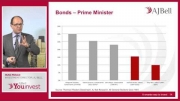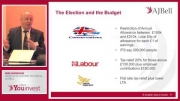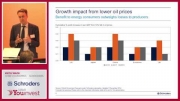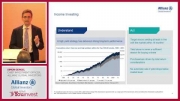Archived article
Please note that tax, investment, pension and ISA rules can change and the information and any views contained in this article may now be inaccurate.

Equity, bond and currency markets remain in thrall to the General Election as the leading parties' campaigns grind remorselessly toward the actual ballot on 7 May. Who will be the nation's Prime Minister after the poll is still open to doubt and the consensus view appears to be a coalition is inevitable, even if no-one knows which parties may be willing to form an alliance with whom, in their bid for power and desire to shape the country's fortunes according to their own philosophy.
Three immediate conclusions can therefore be drawn:
- First, an absolute majority for any party could therefore be seen as a pleasant surprise, especially if David Cameron were to earn a second term in 10 Downing Street
- Second, a coalition should not be the nasty surprise it was in 2010, when May, the month of the ballot, was easily the worst performing month of that year. Equally, the identity of any partners, and the balance of power between them, could influence near-term market sentiment.
- Finally, coalitions in their own right may not be a bad thing. The FTSE All-Share has done well during this Parliament and as Niall Ferguson points out, only a handful of EU members are currently ruled by an absolute majority, so coalitions are hardly unusual in Europe
This is all conjecture but we can look back to history for some possible guide as to what the market may think about the election result. Using the FTSE All-Share since its inception in 1962 as our benchmark, it is possible to observe the following:
- The UK stock market is not necessarily frightened of a change in Government. In the first term of a new Prime Minister the FTSE All-share has done better than under the rule of a victorious incumbent. However, over the full term, the market seems to have a slight preference for more of the same in Downing Street, although the average outperformance is not huge, as the chart below makes clear.
The market does not seem unduly concerned by a change in Prime Minister, if history is any guide

Source: Thomson Reuters Datastream, AJ Bell Research. 1964/66 to 1970 and 1974 to 1979 treated as one administration.
- The size of a Government's majority seems to make no difference at all to how the FTSE All-Share. Some of the smallest majorities have presided over good performance and some of the largest over its worst stretches, both in the first year of a government and during its total time in office. This may offer some reassurance again about a possible coalition.
Past performance suggests the size of majority has little impact on market performance in the first year of Government...

Source: Thomson Reuters Datastream, AJ Bell Research. 1964/66 to 1970 and 1974 to 1979 treated as one administration.
...or during its whole time in office

Source: Thomson Reuters Datastream, AJ Bell Research. 1964/66 to 1970 and 1974 to 1979 treated as one administration.
- If there is one really clear trend in the historic data – and here we must accept past performance is no guarantee for the future – then it is the UK's stock market seems to do best under a Conservative Prime Minister.
The FTSE All-Share has historically done better after a Conservative win

Source: Thomson Datastream, Shares research
This may be because the Conservative party tends to be seen as pro-business and Labour as more wary of the financial markets but investors should remember other factors such as economic growth, interest rates, currency movements and geopolitical issues will have all had a role to play.
In the end, company valuations are determined by profits and more particularly cashflow. Government policy can affect these, at least in the short term, but in the long run cashflow results from a company's competitive position, its pricing power, financial strength and management acumen. Events in 10 Downing Street may have little or no impact upon any of these four vital facets of corporate achievement and as such the events of 7 May must be kept in perspective, especially by those equity investors who run their portfolios on with a long-term time horizon.
Related content
- Wed, 17/04/2024 - 09:52
- Tue, 30/01/2024 - 15:38
- Thu, 11/01/2024 - 14:26
- Thu, 04/01/2024 - 15:13
- Fri, 17/11/2023 - 08:59






